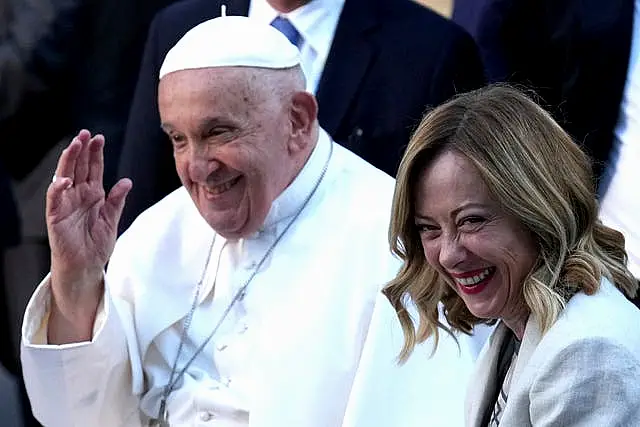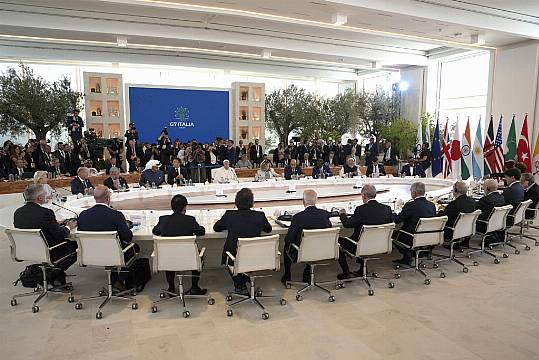The Group of Seven leading industrialised nations turned their attention to migration, artificial intelligence, economic security and the Indo-Pacific region on Friday, the second and final day of their summit in Italy.
The G7 leaders stressed their determination to meet global challenges “at a crucial moment in history”.
The gathering in a luxury resort in Italy’s southern Puglia region also discussed other major topics, such as financial support for Ukraine, the war in Gaza, climate change, Iran, the situation in the Red Sea, gender equality and China’s industrial policy and economic security.
“We are working together and with others to address the pressing challenges of our time,” the G7 leaders said in a final statement, noting their solidarity with Ukraine, support for a deal that would lead to an immediate ceasefire and release of hostages in Gaza, investment in sustainable infrastructure in Africa and commitments to address climate change and migration.

Divisions did emerge during the summit, however, notably over the lack of a reference to abortion in the summit’s final declaration.
Asked if the G7 gathering has lived up to expectations, French President Emmanuel Macron said: “The aim of the G7 is to create convergence and be able to remove misunderstandings. It’s not a place where you decide emergency measures or regulate things.” He added that there were “true convergences on Ukraine and Mideast”.
“It was a useful G7, with useful results,” Mr Macron said. “The coming weeks will create the conditions for political opportunities in particular around the two conflicts.”
Migration was the first topic of discussions on Friday, with the leaders mulling ways to combat trafficking and increase investment in countries from where migrants start out on often life-threatening journeys.
The issue is of particular interest to summit host Italy, which lies on one of the major routes into the European Union for people fleeing war and poverty in Africa, the Middle East and Asia.
Italian Premier Giorgia Meloni, known for her hardline stance on migration, has been eager to increase investment and funding for African nations as a means of reducing migratory pressure on Europe.

The leaders “launched the G7 Coalition to prevent and counter the smuggling of migrants”, the summit’s final declaration said, noting the seven nations would “focus on the root causes of irregular migration, efforts to enhance border management and curb transnational organised crime, and safe and regular pathways for migration”.
Prime Minister Rishi Sunak said he and Ms Meloni – whom he described as “fantastic” – saw “eye to eye” on migration.
“We can’t have criminal gangs decide who comes to our countries,” Mr Sunak said.
Ms Meloni has a controversial five-year deal with neighbouring Albania for the Balkan country to host thousands of asylum seekers while Italy processes their claims. She has also spearheaded the “Mattei Plan” for Africa, a continent-wide strategy to increase economic opportunities at home and so discourage migration.
For its part, Britain has a deal to deport some asylum seekers to Rwanda, although no flights have yet taken off. Human rights organisations have criticised the agreement as unethical and unworkable.
The United States has also been struggling with a growing number of migrants. President Joe Biden introduced new policies to curb migration after a Bill he tried to get through Congress failed to pass. However, the future of the new policies is unclear after immigrant rights advocates challenged them with lawsuits.
Apart from the G7 nations of Canada, France, Germany, Italy, Japan, the UK and the US, the Italian hosts also invited several African leaders — Algerian President Abdelmadjid Tebboune, Kenyan President William Ruto and Tunisian President Kais Saied — to press Ms Meloni’s migration and development initiatives.

But rights groups decried what they said was a lack of ambition in support for developing countries.
The ONE Campaign, which advocates for investment in Africa, said it had found the G7 and EU institutions’ share of aid going to Africa was at its lowest point since 1973.
“Without any concrete action, the G7 in Italy amounts to no more than pointless platitudes,” said David McNair, executive director at The ONE Campaign.
Although the summit’s final statement “reflects promises of increased partnership between the G7 and Africa, there are very few specifics on what new financing, if any, will be available”.
Pope Francis also became the first pontiff to address a G7 summit, delivering a speech on artificial intelligence. Other invitees included Ukrainian President Volodymyr Zelensky, Brazilian President Luiz Inacio Lula da Silva, Indian Prime Minister Narendra Modi and Turkish President Recep Tayyip Erdogan.
The summit opened on Thursday with a strong show of support for Kyiv: an agreement on a US proposal to back a 50 billion-dollar (£39.5 billion) loan to Ukraine using frozen Russian assets as collateral.
Russian President Vladimir Putin denounced the freezing of Russian assets as “theft” and vowed it “will not go unpunished”.
Mr Biden also signed a bilateral security agreement with Mr Zelensky, aiming to send a signal to Russia of American resolve in supporting Kyiv.
But some cracks appeared among the G7 leaders, notably Mr Macron deploring a lack of a reference to abortion in the summit’s final document.
The statement after last year’s summit in Hiroshima, Japan, expressed a commitment to provide access to safe and legal abortion to women and girls, and pledged to defend gender equality and the rights of members of the LGBT+ community.
The word “abortion” was absent from this year’s final communique, although it included a reference to promoting sexual and reproductive health rights.
“It was not possible to reach agreement on these things in the room,” a senior EU official said, speaking on condition of anonymity to reveal details of the private discussions.
Asked on Thursday about reports that abortion would not be included in the final text, Mr Macron said it was something he regretted.
France “has included women’s right to abortion, the freedom of decision on one’s own body, into its constitution”, he said, adding that France defends “this vision of equality between women and men”.
“It’s not a vision that’s shared across all the political spectrum,” Mr Macron said.
Ms Meloni, who campaigned on a “God, Family, Fatherland” motto, has denied she is rolling back rights to abortions, which have been legal in Italy since 1978. But the centre-left opposition has warned that her initiatives are chipping away at those rights, including by giving pro-life groups access to women considering abortions.







